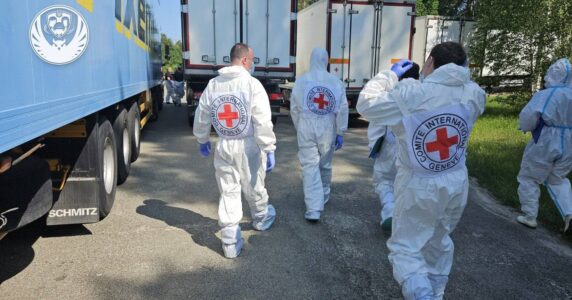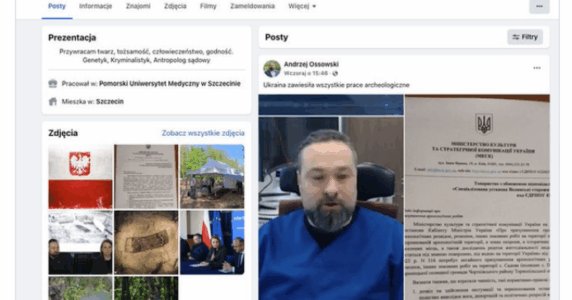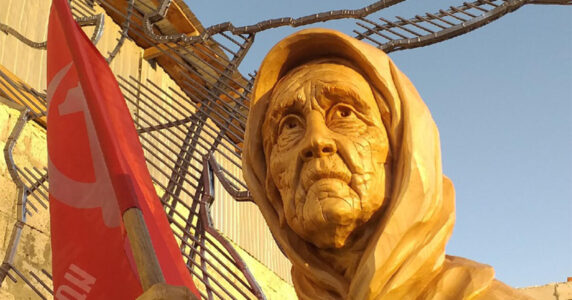Navigation and useful materials
Ukrainian flags have been flying over liberated Kherson since last week. The loss of control over the only regional centre of Ukraine, which the Russians managed to occupy during the full-scale invasion, was a powerful blow to the already damaged reputation of the military and political leadership of the Russian Federation. It was up to propagandists to tie up loose ends. Although they were more coordinated this time than during the September flight of the occupiers from the Kharkiv oblast, they still didn’t manage to hide the growing ideological split.
Russians’ preparation for the surrender of Kherson
The command of the Russian army obviously understood the futility of trying to hold Kherson while the Armed Forces of Ukraine methodically destroyed the enemy’s logistics. Therefore, the withdrawal of units from the city began several weeks before the official announcement. This is evidenced in particular by:
- statements of the Russian command about the “difficult situation” in Kherson and the high probability of “difficult decisions”;
- attempts to intimidate the local population with allegations that the Ukrainian army was preparing a large-scale offensive and massive artillery fire;
- relocation of the occupation administration from Kherson to Henichesk;
- deportation of the civilian population, which the occupiers called evacuation and used to cover the movement of units and equipment from the right bank to the left bank.

All this happened during October. And only on November 9 did the Russian Ministry of Defence release a poorly directed video of a meeting with the participation of Shoigu and Surovikin, at which the decision to leave Kherson was announced.
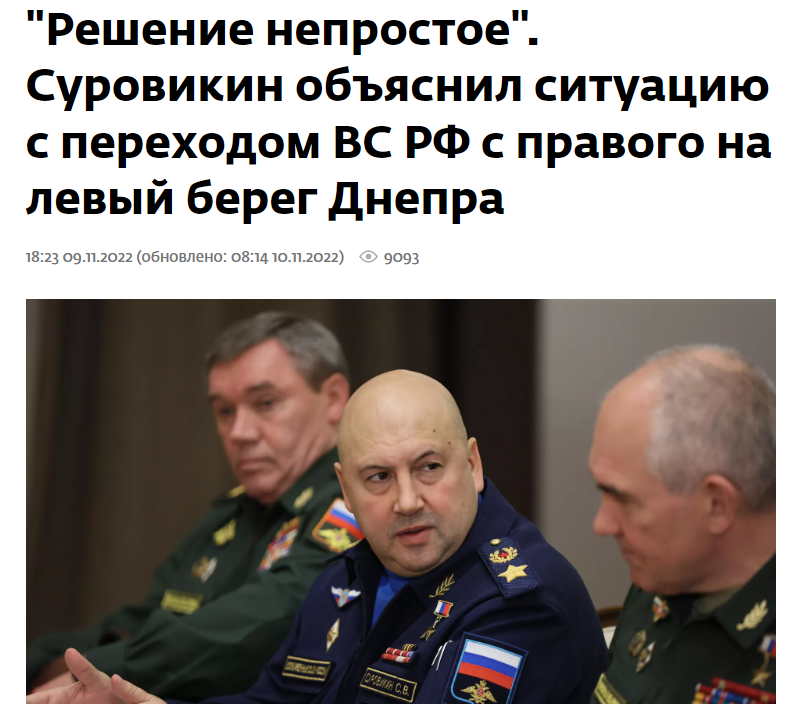
How they explained the need to withdraw troops to Russians
The commander of Russia’s occupation forces in Ukraine Sergey Surovikin explained that the “difficult decision” was made to save the personnel — it was practically the first time since the invasion that the Russian command acted like they cared about the lives of their soldiers.
Russian propaganda generally supported this version:
- Prigozhyn and Kadyrov, who previously generously described the “incompetent generals,” not sparing unkind words, this time said they regarded the “difficult decision” with “understanding.” They even publicly praised Surovikin and his personal qualities;
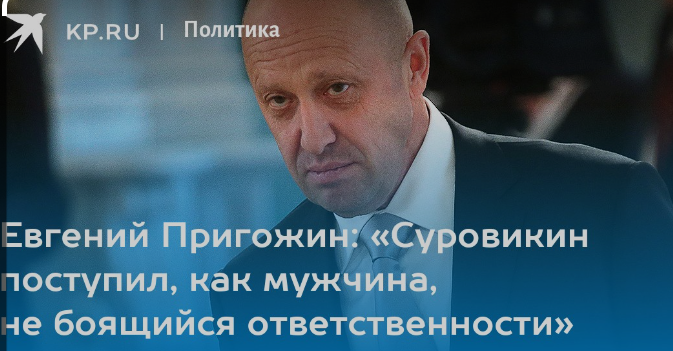
- the same “understanding” was shown by numerous Telegram channels, shifting the responsibility for the “difficult decision” to Surovikin’s “predecessors”;
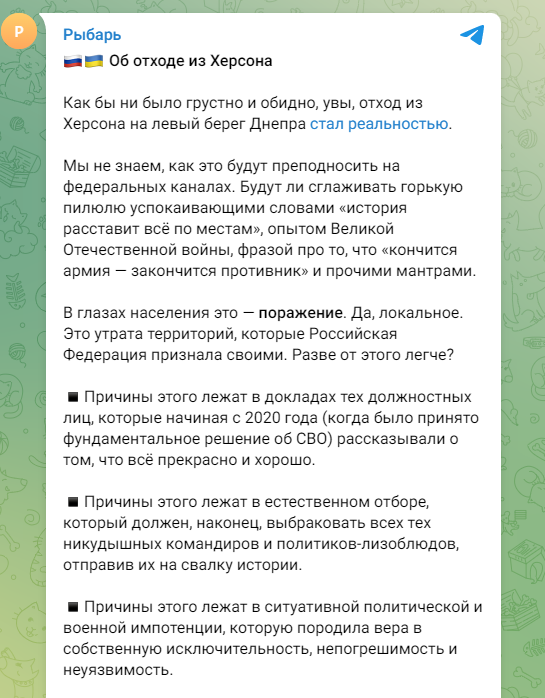
- key propagandists followed the same trajectory, justifying the surrender of the city with alternatives being much worse.
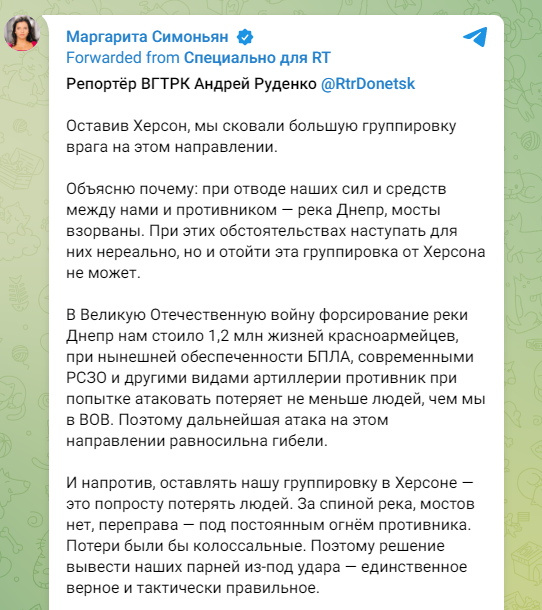
Federal TV channels, on the other hand, tried not to push the subject of Kherson. NTV, Rossiya 1, and Pervy Kanal aired identical stories: excerpts from a military meeting were accompanied by remarks about “regrouping” and “manoeuvres.”

Even the full-time members of the propaganda show “60 Minutes”, including the presenters, were looking for “logical explanations” of the “difficult decision.” The propagandists also tried to veil the situation with geographical euphemisms about “taking up defence on the left bank of the Dnieper”, “moving from the right bank to the left bank” or “the right bank part of the Kherson region”. This way, regular Russians, not too familiar with the Ukrainian geography, would not immediately understand it was about withdrawal from the city of Kherson itself.
Putin’s silence and Dugin’s threats
It is noteworthy that Putin did not say a single word about Kherson. Ironically, less than a month and a half ago, he was the main star announcing the annexation of the occupied regions. This time, his role was limited to signing the decree on the posthumous awarding of the Kherson collaborator Stremousov.
After all, the “tsar” should report only victories. It is the vassals accounting for failures. While Russian troops fled Kherson, Putin spoke with the president of the Central African Republic and the president of the Russian Academy of Sciences.

Not every fan of “strong leadership” was happy with this selective approach. The ideologue of Eurasianism Alexander Dugin even questioned the legitimacy of Putin’s power and hinted at the possibility of his removal due to unfitness for the position.
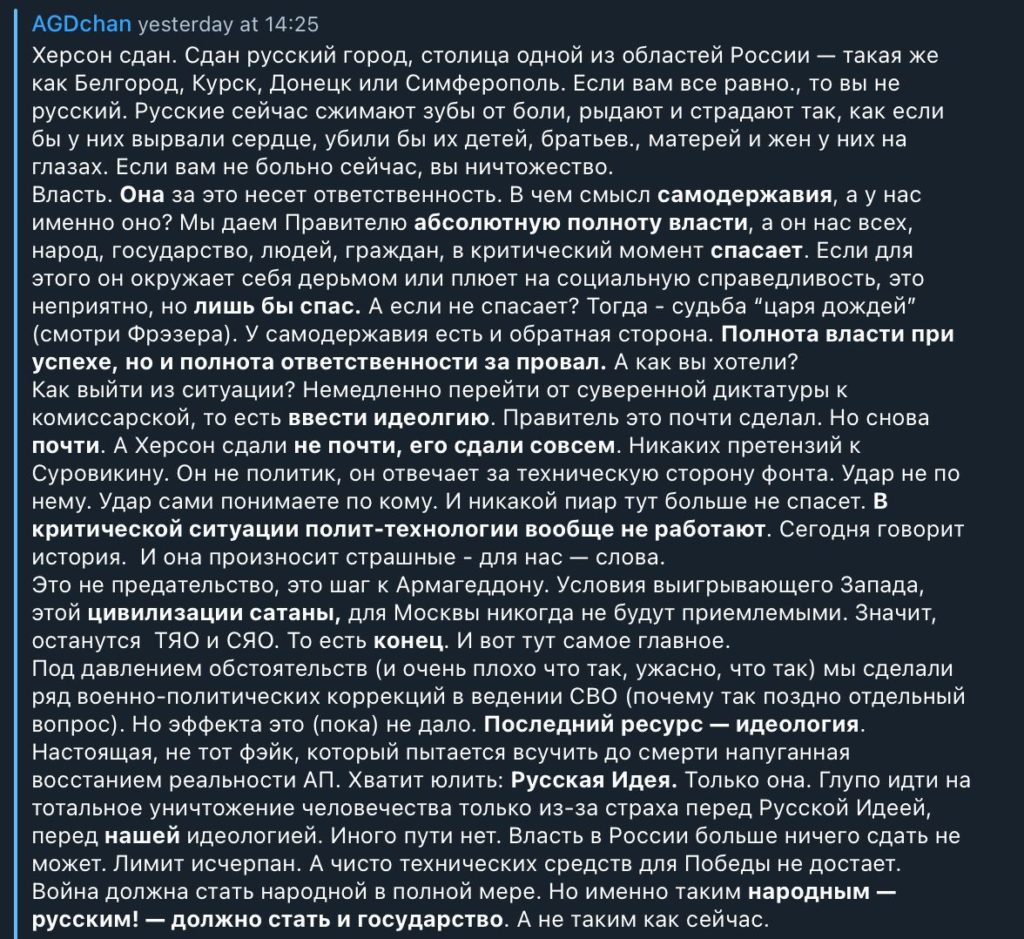
He did it in a veiled manner, referring to James Frazer’s study “The Golden Bough”. The book describes the murder of a ruler by his subjects after failing to summon the promised rainfall in a drought. Subsequently, Dugin deleted the entire provocative post and assured that he, like “all Russian patriots,” supports the president. But the message was noticed.
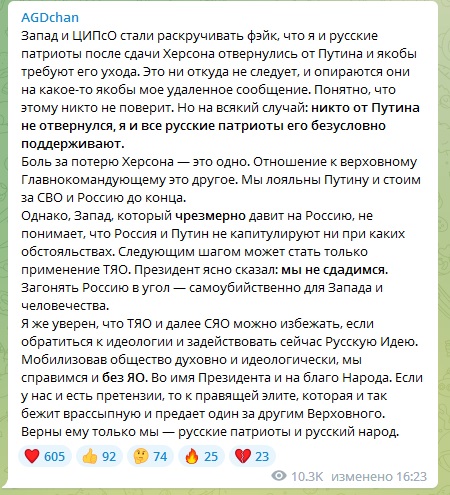
The statement made by Dugin, who is funded by one of the key sponsors of Russia’s 2014 invasion of Ukraine, the “Orthodox oligarch” Malofeyev, is rather telling.
It is becoming more and more difficult to hold back the unhappy voices due to the inability to achieve the goals of the war that would be clear for Russians — a demonstrative punishment of Ukrainians and destruction of Ukraine’s statehood. But before, military correspondents, TV propagandists and raging users of social networks demanded to hit the “decision-making centres,” brutally punish “traitors” and take revenge on the civilian population of Ukraine for Russia’s escape from the Kharkiv region, the destruction of the Crimean bridge and other failures of the Russian army and special services. Now, Putin himself has become the object of criticism, even an outright attack. So far, the Kremlin has been managing to hold the propagandists it has raised at bay and to maintain balance between special services, the army, the Russian Guard, PMCs and other “competing actors.” But for how long?
Centre for Strategic Communication and Information Security
If you have found a spelling error, please, notify us by selecting that text and pressing Ctrl+Enter.
